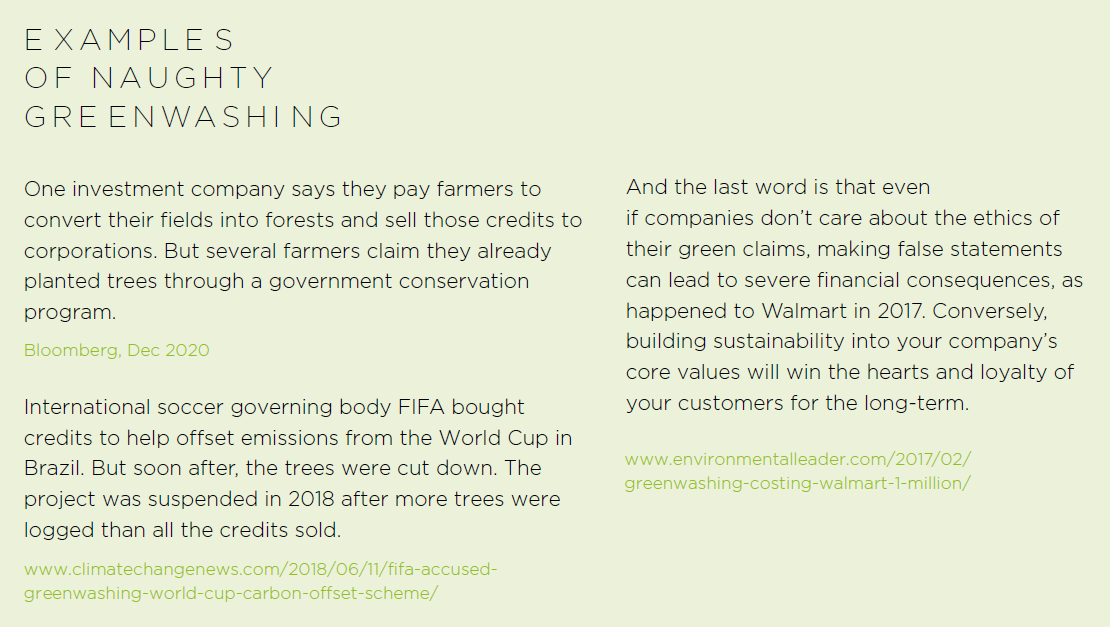Greenwashing is ‘an attempt to make people believe that a company is doing more to protect the environment than it is’ (Cambridge dictionary). Products and services are greenwashed through massive marketing and PR strategies: rebranding, renaming, repackaging. Greenwashing is all about the idea that products and processes are “chemical-free,” “from natural origins,” and less carbon-emitting and more sustainable than their competitors.
But it’s easy to make these claims – as consumers we need to stay alert that some company statements might only reveal some of the truth, or at worst, not be true at all. For instance, arsenic is an ‘all-natural product’ but we wouldn’t want to find it in our face cream!
A common example of greenwashing is a claim suggesting that a product is green based on certain characteristics without considering other important environmental issues. For example, just because a paper product comes from a sustainably harvested forest, it is not necessarily environmentally friendly. There may be other important environmental issues in the background, such as the greenhouse gas emissions or chlorine used in bleaching during the paper-making process.

The other side of the coin
So what can we do to understand whether a product or service has been greenwashed or not? And how can companies that genuinely wish to behave in a responsible sustainable way prove their integrity to their potential customers?
As consumers, we need to be on the alert to look below the surface and investigate claims, particularly if we are making a big investment and wanting to make choices that will have an impact on the health of the planet. Can the company claims be verified by third parties? If a product claims to meet named industry standards, is this actually true? A little Internet research these days will usually reveal the truth.
Proving your integrity as a company concerned with sustainability derives from your values and the way you bring these to life through all your activities and choices. Your decisions will lead to products and services that genuinely do their job better and make a difference to people’s lives rather than just innovating for innovation’s sake. Honesty and transparency are the watch words – there’s nothing wrong with a great marketing campaign to sell an amazing new product when it really meets a need and has been developed and produced sustainably. And it will be all the better because your customer will be able to look behind the scenes and see all the steps you have taken to fulfil your values.
Carbon offsetting
Companies that are unable to eliminate all carbon-emitting activities can purchase carbon credits which offset the amount of carbon they produce. Each carbon credit equals the cancelling out of 1 ton of carbon in the atmosphere. The money raised goes towards mainly agricultural or forestry projects, although a credit can be made by nearly any project that reduces, avoids, destroys or captures emissions. Individuals or companies looking to offset their own greenhouse gas emissions can buy those credits through a middleman or those directly capturing the carbon. In the case of a farmer that plants trees, the landowner gets money; the corporation pays to offset their emissions; and the middleman, if there is one, can earn a profit along the way.
This last point of course is where purchasing carbon credits also demands caution. There are scam schemes waiting to catch out those who don’t do their homework, so it’s best to look for projects and programmes that are third party verifiable, such as the Verified Carbon Standard (Verra), Gold Standard, Plan Vivo and several others.
As an example, in the words of Verra CEO David Antonioli, “The three main things that make up the Verra Carbon Standard are: accounting methodologies specific to the project type, independent auditing and a registry system. This is to make sure that both the buyer has confidence that they’re buying something that is actually legit, and that the sellers themselves have something valuable.” (NBC News).


.jpg?VGhlIFBlcmZlY3QgU2xvdC1pbijmraPnoa4pLmpwZw==)












.jpg?MTkyMHg3MjDvvIhkZXPvvIkuanBn)
.jpg?MTAyNHg3NDDvvIhkZXPvvIkuanBn)



















